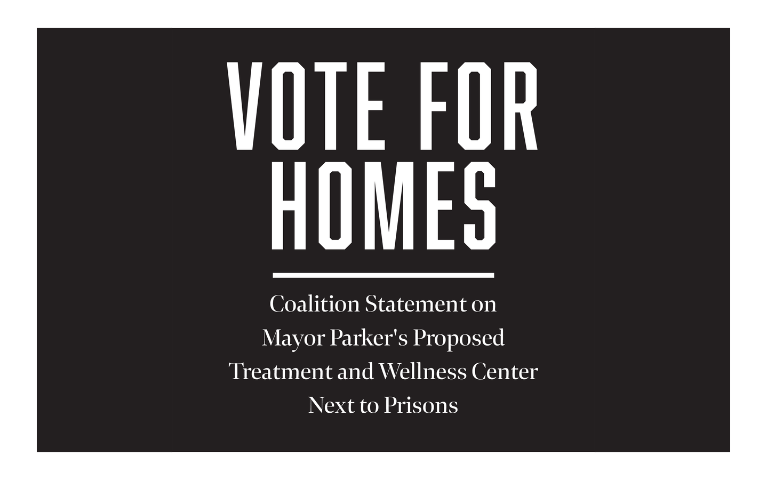Service providers, advocates call for transparency and accountability as City Council authorizes $100 million treatment facility

Our organizations were deeply concerned to read newly released details about Mayor Parker’s proposed treatment and wellness center in the news last week. The decision to locate the facility next to the prisons, to house more than 600 people in one facility and to place people there involuntarily is antithetical to the values that we hold and the recommendations that we provided to the Mayor’s Office over the past month.
Our organizations participated in two architectural planning meetings in May and June that were organized by the Mayor’s Office to vision what a treatment and wellness center should look like. One of the most important principles we articulated during these meetings was that people must voluntarily access the services. Successful recovery is built on trusted relationships in which people are treated with dignity and respect. Rarely, if ever, is successful recovery compatible with forced or coerced treatment.
In addition, the size and the location of the proposed facility would make it impossible to implement many of the critical recommendations we made. The location is both difficult to access and directly next to the city’s jail complex. Many people using drugs have experienced the trauma of incarceration in our city’s jails, and locating a treatment facility directly next door is incompatible with healing and wellness.
As service providers and leaders in our fields, we have many serious concerns and unanswered questions about this project. Wellness centers should be holistic in design and operation and ensure a smooth transition to long-term sustainable permanent housing following completion of the program. We urge Philadelphia City Council to establish a special committee to oversee the development of the proposed treatment facility, ensuring a detailed plan is in place before moving forward and including a thorough public engagement process. As stewards of our city tax dollars, it is incumbent upon City Councilmembers to ensure these funds are spent wisely and lead to lasting change.
At minimum, Philadelphians deserve to see a plan and have their voices heard before the city invests significant funding in the same failed strategies of criminalizing and forcibly institutionalizing our neighbors.
Signed,
Sister Mary Scullion, Executive Director, Project HOME
Candice Player, JD, PhD, Vice President of Advocacy, Public Policy and Street Outreach, Project HOME
Cheryl Hill, Senior Vice President, Supportive Housing Operations, Project HOME
Rev. Robin Hynicka, Lead Pastor, Arch Street United Methodist Church
Deaconess Darlene DiDomineck, Executive Director, Center-Philadelphia
Tanya L. Rambert, Executive Director, Homeless Advocacy Project
Geremi James, LSW, long-time advocate for the unhoused
Sterling K. Johnson, JD, MA, Philadelphia Housing Action
Bill Maroon, MSW, Pathways to Housing PA
Julie Zaebst, MSS, MLSP, ACLU of Pennsylvania
Garrett O’Dwyer, MPH, Philadelphia Association of Community Development Corporations